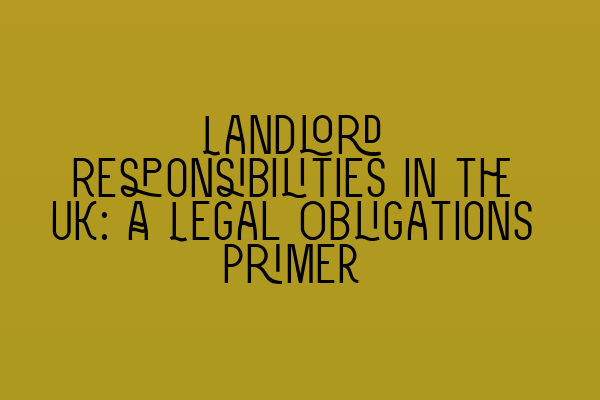Landlord Responsibilities in the UK: A Legal Obligations Primer
Welcome to the SQE Property Law & Land Law blog! In this article, we will explore the essential legal responsibilities of landlords in the UK. Whether you are a new landlord or an experienced property investor, understanding your obligations is crucial to ensuring a smooth and compliant tenancy. So, let’s dive right in!
1. Safety and Maintenance
First and foremost, landlords have a legal duty to provide a safe and habitable environment for their tenants. This includes ensuring that the property meets all health and safety standards. From electrical safety to fire regulations, compliance is key to protecting your tenants and avoiding legal issues.
Regular maintenance and repairs are also a vital responsibility. It is important to promptly address any issues that may arise during a tenancy, such as plumbing problems or structural damage. Failure to meet these obligations can result in legal action and potential financial penalties.
2. Tenancy Agreements
A tenancy agreement is a legally binding contract between you and your tenant. It sets out the terms and conditions of the tenancy, including rent, duration, and other important details. As a solicitor, I highly recommend having a written tenancy agreement in place to avoid disputes and protect your interests.
It is essential that the tenancy agreement complies with the relevant legislation, such as the Housing Act 1988 or the Rent Act 1977. Familiarize yourself with the latest laws and regulations to ensure that your agreements are legally enforceable.
If you would like to test your knowledge on contract law, check out our Interactive SQE Mock Tests for Contract Law: Test Your Knowledge article.
3. Deposit Protection
When renting out a property in the UK, landlords are required to protect their tenants’ deposits in a government-approved tenancy deposit scheme. This protects the deposit and ensures it can be returned to the tenant at the end of the tenancy, minus any agreed deductions.
Make sure you provide your tenant with the required information regarding the deposit protection scheme within 30 days of receiving the deposit. Failure to comply with this obligation can result in legal consequences, such as being unable to evict your tenant using a Section 21 notice.
4. Right to Rent
Under the Immigration Act 2014, landlords in the UK have a duty to conduct right to rent checks on their tenants. This is to ensure that they have the legal right to live in the country. Failing to carry out these checks can result in severe penalties, including fines and potentially even criminal charges.
5. Energy Efficiency
From 1st April 2018, landlords must ensure that their rented properties have a minimum energy performance rating of E on an Energy Performance Certificate (EPC). This requirement applies to both residential and commercial properties, and failure to comply may result in financial penalties.
To learn more about recent contract law reforms, take a look at our Contract Law Reforms: An Analysis of Recent Changes article.
6. Insurance
While not a legal obligation, it is highly recommended that landlords have appropriate insurance in place to protect their property and liabilities. Landlords’ insurance can provide cover for risks such as damage to the property, loss of rent, or public liability claims.
Conclusion
As a landlord, understanding your legal responsibilities is crucial for maintaining a successful and compliant tenancy. By providing a safe and habitable environment, having a legally enforceable tenancy agreement, protecting deposits, conducting right to rent checks, ensuring energy efficiency, and considering appropriate insurance, you can safeguard both your interests and those of your tenants.
If you want to explore more about parties’ rights and responsibilities in contracts, I recommend reading our comprehensive article on Parties in a Contract: Rights and Responsibilities.
Lastly, if you want to dive deeper into the ethics of contract law, our guide on The Importance of Ethics in Contract Law: A Comprehensive Guide provides an in-depth analysis.
Thank you for reading, and we hope this article has helped clarify your landlord responsibilities in the UK.
